Angels are a natural fit for SFF. In appearance they can range from the most shocking beauty to the utter grotesquerie. They are conduits between one plane of reality and another, tasked with trying to help very different species understand each other. (What is an angelic encounter but a first contact story?) And according to some traditions, they have their own high drama built right in, a tale of celestial war, a fall from grace, and a new and terrible kingdom forever building itself as a monument to horror.
See? Pretty dramatic. I’m not going to retell that story, though, that’s too much drama even for me. Instead I’ve rounded up a few of my favorite angels from books, film, and even video games. Come add yours in the comments!
Aziraphale, Good Omens by Neil Gaiman & Terry Pratchett
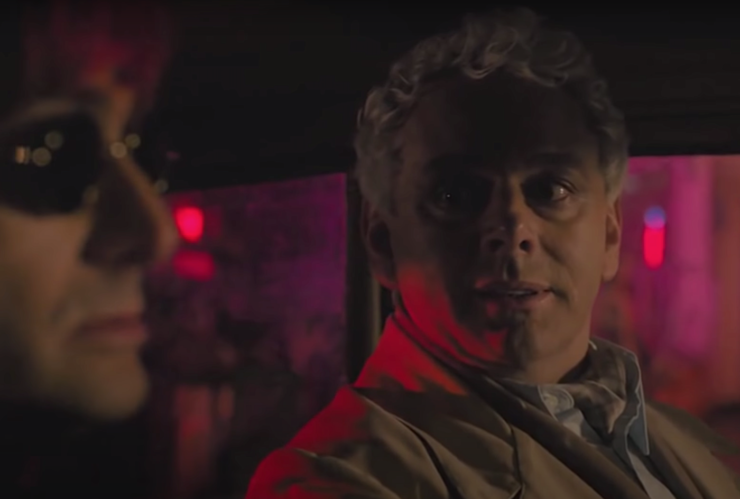
Aziraphale already had a rabid, if polite, fanbase. Neil Gaiman & Terry Pratchett’s Good Omens became an increasingly beloved book over the decades since it was published, and inspired a thriving fanfic community. But when Michael Sheen stepped into the role for Amazon’s adaptation, Aziraphilia truly came into its own. Sheen’s portrayal was absolutely true to the book, but watching him play off David Tennant’s Crowley and fuss over his books and fret over tea and just generally be the cuddliest personification of ineffability anyone could imagine added a whole new dimension to the character. And when the Nebula Award-winning episode “Hard Times” expanded on the book’s narrative, we got to see the full scope of his love for Crowley, and came damned close to angelic perfection.
Buy the Book


Good Omens
Crow, The Angel of the Crows by Katherine Addison
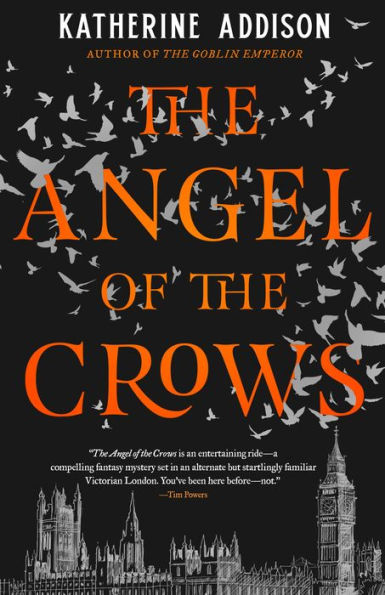
Katherine Addison’s latest, The Angel of the Crows, started life as a fanfic riff on Sherlock Holmes: what if, rather than simply being “on the side of the angels”, Sherlock was transformed into one of them? From that core concept a fascinating alternate Victorian London grew, crowded with public houses run by werewolves and revenants who stalk the night in search of their missing skulls. By far the most important supernatural creatures in Addison’s universe are the angels. “Good” angels claim mystical ownership of particular site, maybe taking up residence in a tavern, or watching over the Underground. But if some harm befalls their home, the celestial beings are offered a choice: “Dissolve” yourself, with no hope of resurrection, or join The Fallen. Our Watson analogue, Dr. Doyle, has just returned from fighting The Fallen in Afghanistan when he meets a mysterious angel named Crow who needs a flatmate.
But why does Crow need a flatmate? And how has he managed to survive freely, without a home, without Falling himself?
Buy the Book


The Angel of the Crows
Sephiroth, Final Fantasy VII, etc.
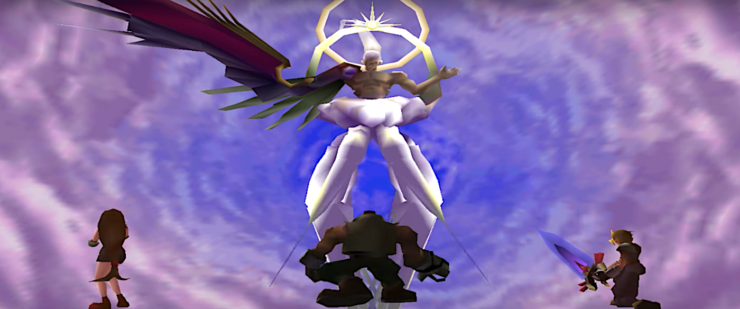
OK, so this one might be stretch, but I have to honor this JRPG’s dedication to angelic symbolism. Sephiroth is the strongest member of a powerful military group subtly called SOLDIER, but his life is turned upside down when he discovers that he was implanted with cells from an alien/god named Jenova. Not a fan of half measures, he decides to tap into the mystical Lifestream to become a full god. And if he has to harness interdimensional powers and destroy his planet to do it, well, that’s a small price to pay to achieve his true goal of repeatedly traumatizing Cloud Strife.
In the game’s final battle, he transforms in Safer-Sephiroth, and sprouts a magnificent black wing. Just the one, though. Two wings would be overkill.
The Angel of America, Angels in America by Tony Kushner
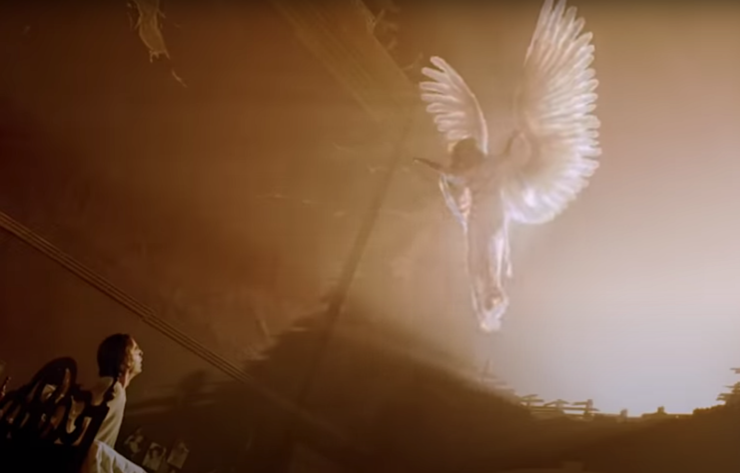
There are a whole host of angels in Kushner’s iconic play, from real celestial entities to the pristine statue of Bethesda in Central Park. But the one who gets the most stage time is the Angel who reveals herself to be “four divine emanations: Fluor, Phosphor, Lumen, and Candle; manifest in One: the Continental Principality of America.” She closes the first play in the cycle, Millennium Approaches, by crashing through protagonist Prior Walter’s ceiling. Over the course of the second play, Perestroika, she grinds Prior’s will down as she tries to force him to become a new prophet, with a terrible prophecy of stasis. It turns out that humanity’s need for constant progress and growth causes cataclysm in Heaven, and America and the other Angels are pretty sure the humans drove God away, too.
Buy the Book


Angels in America
The Sons, “Their Sons Return Home to Die”, Moonflower, Nightshade, All the Hours of the Day by J.D. Scott
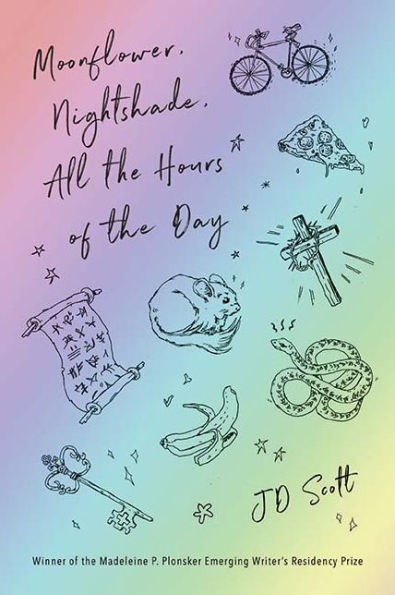
Following on Kushner’s Angels, JD Scott created a fable of the AIDs epidemic in “Their Sons Return Home to Die”
Here the angels are the urban queer communities that welcomed wave after wave of rural misfit boy, sons that couldn’t live their true lives in oppressive small towns, only to have to watch as these sons went back to their homes to die.
A tableau vivant: the sky like toy stuffing, polyester dyed sea foam, like goose down, like loose down, and when the plush clouds open, their sons descend down. Their sons come with wings too small for their bodies. The wings are costume, but also attached to their skeletons. The bones are part of their bodies. The wings are real too.
The angels are the sons, and they are the men who have, so far, remained healthy. Heaven is a blacklit club, a pulse of music, a crush of arms and feathers.
Buy the Book


Moonflower, Nightshade, All the Hours of the Day
Gabriel, Constantine
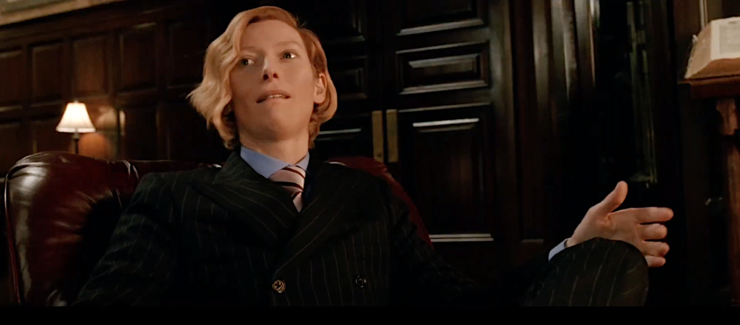
Is Gabriel my favorite angel on this list? After a somewhat hackneyed opening, his appearance is the first hint the audience gets that Constantine is going to be a bit more interesting than yet another riff on The Exorcist. John Constantine, dying of lung cancer and doomed to Hell, tries to plead his case with the angel, who acts as a conduit between Heaven and Earth. His argument is that each time he “deports” a demon back to Hell, he’s kinda sorta doing God’s work, right?
Gabriel, with a crispness only Tilda Swinton could provide, tells John: “You are going to die young because you smoked 30 cigarettes a day since you were 15… and you’re going to go to hell because of the life you took. You’re fucked.”
And he only gets more fun from there. I don’t even have the emotional bandwidth to talk about his shift from bespoke suits to a tattered gauze corset-and-legging ensemble. Whenever the perennial “Which movie deserves a sequel?” question makes the rounds on Twitter, there is but one correct answer.
Proginoskes, A Wind in the Door
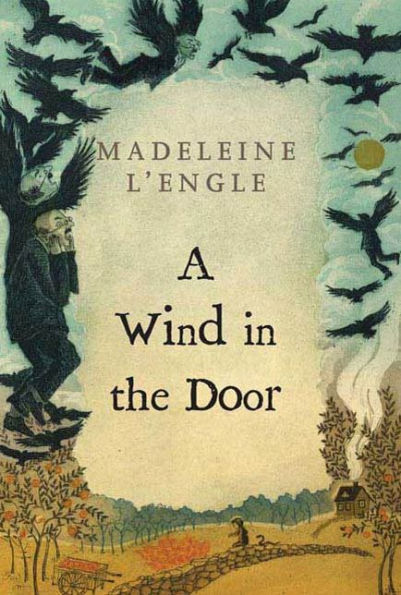
Proginoskes, or Progo as he is soon nicknamed by his human friends, is a singular cherubim. Like the rest of his species, he is a frightening cluster of folding wings and blinking eyes. He’s also pretty cranky about being stuck with a mission on Earth—among angels, anything to do with humans is a tough assignment. In A Wind in the Door L’Engle uses Progo to build on her already bustling theological fantasy realm, using him as a mouthpiece for morality in a similar role to the three Mrs. W’s in A Wrinkle in Time. This time, Progo has to help Meg Murry save her little brother Charles Wallace from a terminal illness that is as much spiritual as physical. Along the way he snarks on every human concept, and explains the terrifying concept of “X-ing”, in which a cherubim summons an immense burst of energy as a defense mechanism…but also ceases to exist. Much like The Angel of the Crow‘s idea of “dissolution” this is a noble act that undercuts the presumed immortality of heavenly creatures.
Buy the Book


A Wind in the Door
Adam, Lilith, et. al, Neon Genesis Evangelion
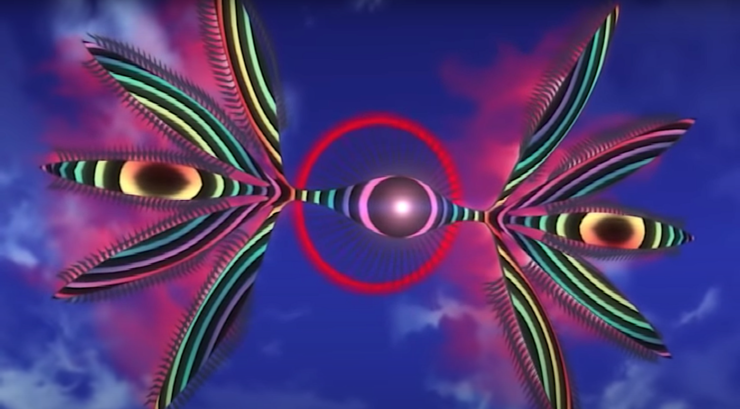
In the beginning there were two Angels, Adam and Lilith. Fifteen more angels descended from the pair, while the human race call Lilith mother. Unfortunately for humanity, Adam’s fifteen kids have all eaten of the Fruit of Life, making them very, very difficult to kill. And they just keep attacking humanity, in a nightmarish cycle of destruction and pain. Luckily humanity can rely on a small team of emotionally-unstable child robot pilots, and their alcoholic guardian, to sometimes, just barely, keep the Angels at bay.
Sometimes.
The Metatron, Dogma
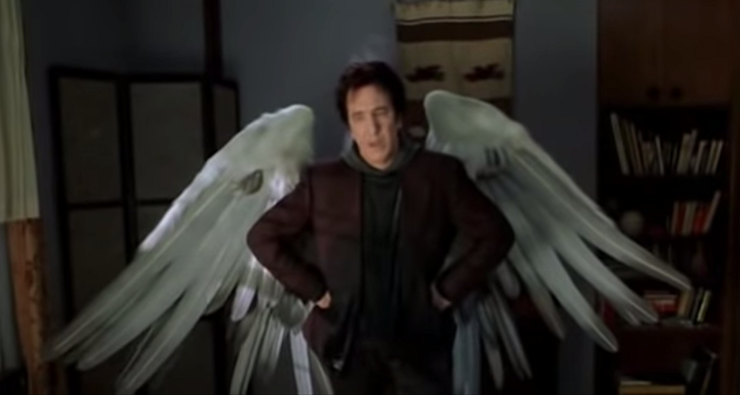
As we all know, Alan Rickman was always perfect. He was perfect in Die Hard, perfect in Robin Hood: Prince of Thieves, perfect in Truly, Madly Deeply, and perfect in Love, Actually. But he might have been most perfect in Dogma, simply because the movie, while heartfelt and often good, is also, often… less good. But as scattered and overstuffed as it was, Rickman’s turn as The Metatron was amazing—particularly because it didn’t have to be. He could have just been snarky and annoyed at the human antics. Instead, by the end of the film, he genuinely cares for the people he’s been stuck with. He also proves a meta point, because after being annoyed with Bethany for not recognizing him, but knowing all about the Plagues of Egypt (“Tell a person that you’re the Metatron and they stare at you blankly. Mention something out of a Charlton Heston movie and suddenly everybody’s a theology scholar.”) it’s probably safe to say a lot more people have learned about The Metatron from this movie than Sunday School.
Geno, Super Mario RPG: Legend of the Seven Stars
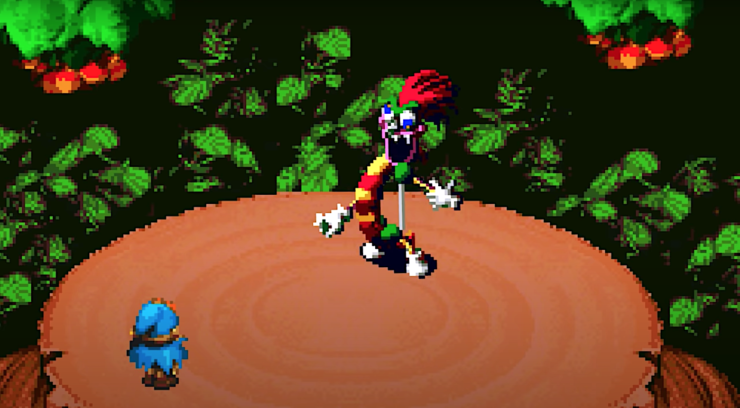
Sometimes angels have to fight their fallen siblings. Sometimes, they are charged with driving humanity from Paradise. And sometimes, they have to battle megalomaniacal robot blacksmiths. Such is the fate of Geno in Super Mario RPG: Legend of the Seven Stars. After the Star Road is shattered, the celestial spirit enacts a very specific take on tikkun olam, gathering Star Pieces so that he can end the evil reign of Smithy, the previously-mentioned robot blacksmith. But since celestial spirits don’t have much weight in Mario’s world, he chooses to do this by possessing a doll named Geno.
Look, judge if you must, but as Geno himself says: “I serve… a higher authority…”
Those are some of my favorite feathered folks—who’s your pick for best fantasy angel?










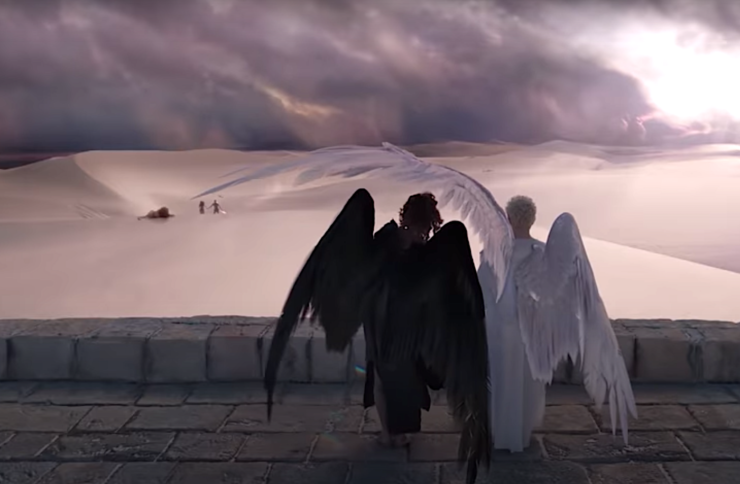
Duma and Remiel from Sandman/Lucifer. Castiel and Lucifer from Supernatural.
I love a number of the angels on your list (Metatron, Aziraphale, Proginoskes, America). My newest favorite is the angel Alizar from CSE Cooney’s short novel “The Twice-Drowned Saint: Being a Tale of Fabulous Gelethel, the Invisible Wonders Who Rule There, and the Apostates Who Try to Escape its Walls,” found in the Sinister Quartet anthology from Mythic Delirium. He has some of Aziraphale’s adorableness of personality, and a visual appearance that sometimes reminds me of Progo. The rest of the angels who rule Gelethel are … not nice. But Alizar is fascinating and ultimately as likeable as an ineffable presence can be.
Castiel: Dean, it appears that I have not been included on this list.
Dean: Seriously?
Lucifer (from Vertigo and Fox): Sucks, Boys.
Two further nominations:
Raphael, from the trilogy by R. A. McAvoy beginning with Damiano.
“Satan’, from Steven Brust’s To Reign In Hell.
Yeah, defintely the angels, fallen and otherwise, from SUPERNATURAL. To quote Dean, “they are all dicks.” Except Castiel, of course, who is annoying but not a dick.
In better news for Constantine, he regained his soul and saved the “little” girl he lost in the most recent season of LEGENDS OF TOMORROW. Yeah, John.
The fall season trailer for the CW threaded visuals together to look like Dean is shooting Beebo, the Viking God of War and Cuddles. No, just, no, Dean. That’s not cool.
As others have named Castiel, I’ll mention Zauriel, the semi-fallen angel of DC comics.
I’ll second Raphael from Roberta MacAvoy’s wonderful Damiano trilogy.
I agree with John C. Bunnell. Raphael from R.A. MacAvoy’s Damiano trilogy is my favorite angel, with Raphael (the last book) being my far and away favorite book in the series.
it’s probably safe to say a lot more people have learned about The Metatron from this movie than Sunday School
I mean, that’s probably because the Metatron doesn’t appear at all in the mainstream Christian tradition. He (?) is a figure from the Jewish mystic tradition, but didn’t have any direct influence on Christianity, at least before the twentieth century.
John Travolta in the movie “Michael,” a cigarette-smoking angel who walks around the house in his underwear (at least when we first see him), wings and all. Tagline for the movie: “He’s an angel, not a saint.”
Mehiel from Elizabeth Bear’s Hell and Earth. Her Michael from Whiskey and Water is also great.
Philip Pullman’s gay angels, clearly based on Milton’s Paradise Lost comment that angels can manifest as any gender and also (Book 8) have sex with each other.
This is a wonderful miscellanea !!!
Asmodeus from Aliette de Bodard’s Dominion of the Fallen series.
Uriel from the Dresdenverse.
I’m also fond of Raphael and Progo.
And I like the angels in Sharon Shinn’s Samaria series.
In the opening pages of Elizabeth Knox’s The Vintner’s Luck, a young French peasant named Sobran Jodeau climbs a hill at night with two bottle of stolen wine, “to baptise the first real sorrow of his life”. He meets an angel. He faints. “He lay braced by a wing, pure sinew and bone under a cushion of feathers, complicated and accommodating against his side, hip, leg, the pinions split around his ankle. The angel was breathing steadily, and smelled of snow”.
The angel is called Xas, he’s gay, he’s weird, he’s my favourite angel anywhere. Ebook here if you want it: https://mebooks.co.nz/fiction/novels-contemporary/the-vintner-s-luck-ebook?page=5&limit=80
On no account watch the appalling film version.
Lyda Morehouse’s theo/cyberpunk Angel:LINK series is spoiled for choice, but while Michael and Morningstar are both undeniably hot, non-binary Angel of Color Ariel/Uriel is always fabulous.
Essay assignment: Compare and contrast Gabriel form Constantine and Gabriel from Prophecy. Who played it better; Swinton or Walken? Not to mention that Prophecy also had Viggo Mortensen as Lucifer; so bonus points there.
Remy Chandler
(Christopher Walken as) Gabriel from The Prophecy
(Viggo Mortensen as) Lucifer from The Prophecy
Lucifer from DC Comics & Lucifer from Fox/Netflix (they’re really 2 different characters)
Castiel from Supernatural
Remy Chandler by Thomas Sniegoski
mndew @19. Christopher Walken. No contest.
Can we count Kosh in Babylon 5 as an angel?
Thanks for reading my musings.
AndrewHB
Lucifer from the TV show Brimstone was one of the best Lucifers ever.
Gandalf!
No love for Clarence in “It’s a Wonderful Life”?
Another vote for MacAvoy”s Raphael. But Dresden’s Uriel is fun too. God’s wetworks Archangel.
CS Lewis’s Planetary Angels.
Well, she’s not really an angel, but the alien “girl” who hatched from Edgar Pangborn “Angel’s Egg”.
Dill and his kin from Alan Campbell’s Deepgate Codex Trilogy: Scar Night, Iron Angel & God of Clocks. There are also 2 novellas: Lyle Street & Damnation for Beginners. All are highly recommended by me. Jon Courtenay Grimwood wrote this about Scar Night in his review: “Scar Night contains echoes of Paradise Lost, Gormenghast and TH White’s Once and Future King.” The 3 primary novels were all published by TorUK & Bantam Spectra. The novellas by Subterranean.
“A singular cherubim” would be a cherub. Everyone used to know this. I don’t know what the world is coming to.
Exit, grumpily.
All my favorites already mentioned: the Metatron, Philip Pullman’s angels, Michael, and the Samaria angels. Great that MacAvoy’s Raphael also goes by Chief of Eagles and the Great Djinn.
Leah Schnelbach, I’m not going to lie my favourite bit of this entire article is your arguing in favour of a sequel to CONSTANTINE (2005): quite frankly one would love to see Mr Reeves’ version of the character sit down next to Mr Ryan’s, if only for the chance to at something like –
REEVES: “John”
RYAN: “Constantine”
REEVES: “Demons?”
RYAN: “Always”
REEVES: “Just gotta keep working on that”
A few possibly-amusing running jokes occur to me – the two of them arguing over which of them was first, the two of them being nearly impossible for others to tell apart (despite being visibly different in appearance and moderately distinct in character) and neither of them deigning to discuss the fact they share both the same career & exactly the same career (leading to speculation on the part of other characters, some more serious than others).
Bonus points if Gabriel shows up as stalker/sidekick/arch-frenemy to Constantine (Reeves); Oh God, now I have a mental image of Ms. Tilda Swinton and Mr Tom Ellis teaming up to snark-and-or-bitch about Constantine …
I realize it’s a bit out of the mainstream, but the Kill Six Billion Demons comic has some [i]spectacular[/i] angels. Particular shoutout to 6 Juggernaut Star Scours the Universe!
My favorite angels in fantasy fiction are Gandalf from the Middle-Earth novels, and Castiel from Supernatural
Samael from Sandman Slim. I’d say Stark but he is only half Angel and rejected the title of Lucifer.
Angels are not exactly the good guys in P. Djeli Clark’s A Dead Djinn in Cairo.
Balthamos and Baruch (His Dark Materials) share a love story for the ages and exhibit a level of complexity that is rarely seen when tackling this subject matter. Pullman drew heavily from Milton, but crafted these characters in a way that made the questioning of religious dogma as real for the readers as it was for the characters.
@30: No, no, that’s the entire point. In A Wind in the Door, the character Proginoskes is a mass of wings and eyes and flames, and refers to himself as “a cherubim”. When the human characters point out that “cherubim” is plural, and that the singular is “cherub,” he responds that he is “practically plural”, and that he feels offended by the images of chubby winged babies that the word “cherub” conjures up in their minds; it is then that he refers to himself as “a singular cherubim”. L’Engle knew very well what the singular and plural were; she was playing with the word and the image.
@37: The very first thing that came to my mind when I saw this post was the unorthodox angels of A Dead Djinn in Cairo.
THE ANGEL LEVINE (1970) got some withering reviews from film critics, but I enjoyed Harry Belafonte as a black Jewish angel (m-m-m-maybe) trying to renew the faith of an embittered Jewish merchant (Zero Mostel) whose wife is dying.
@18 Love Morehouse’s series!
Also, A Madness of Angels and the rest of the series, by Kate Griffin. Psychotic blue angels found on telephone lines, magical underground subcultures, shamans, demons, harpies, oh, my. Can’t recommend the series enough.
In Dublin Town there are churches. In the churches are gargoyles. The gargoyles are out-of-work Avenging Angels. Come the New Testament, God outsourced the Angelic Avengers’s jobs. So He gave them new careers. He installed them in gargoyles, to protect the sacred sites.
That’s where St. Patrick’s Gargoyle, by Kathryn Kurtz, begins.
Try The Last Rogue Soul of the guardianwatchseries.com
Book 2, the prequel, End of Dragons is due out late summer. It Is the formation of Guardian Angels. The series is a fantasy adventure and not a religious series. Dragon Warriors, Wizard, Demons, the ultimate evil himself.
Book 3, Demon Within is due out next spring.
Thank you for the Constantine and Dogma love! Both of those characters (and the actors playing them) don’t get the love they deserve. I think Constantine’s Satan/Lucifer is one of the best versions of the character, too. Also, thank you for recommending my next book (Angel of Crows). There is a literary host of angels that I would like to recommend to you in The Silver Cloud Cafe. It’s not that well known outside of a Chicano literature course, and it can be a confusing narrative at times, but it works the angelic nature of its characters in the story in wonderful and adventurous ways.
Castiel, Castiel, Castiel ….catch my drift?
In the video of “All the Good Girls Go to Hell, Billie Eilish’s angel, cast out of heaven, learns how to flex her oil-soaked wings on the eco disaster called Earth.
Chihaya and Kagetsuya from Earthian.
Damiel (Bruno Ganz) in Wings of Desire.
The Angel Islington, from Gaiman’s Neverwhere. Both the book and TV version (Peter Capaldi!) are great.
We are all Kosh!
In Rob Thurman’s two book set, Grimrose Path and Trick of the Light, angels have constructed such a bureaucracy and extensive administration for themselves, that they have become somewhat typical bureaucrats … watching their backs, going with the flow, and have somewhat lost touch with God, not dark, not evil, but some have slipped over into arrogance…. while this doesn’t put them in my “favorite angel” category, it certainly makes the set fun, interesting, intriguing, and I humbly offer it for consideration in your future reads.
No one appears to have mentioned my favorite angel series, the Samaria books by Sharon Shinn. Gabriel in Archangel is my favorite angel.
I remember fondly Mr. Jordan (done by Claude Raines in Here Comes Mr. Jordan (1941) with Robert Montgomery, Ronald Culver in Down to Earth (1947) with Rita Hayworth, James Mason in Heaven Can Wait (1978) with Warren Beatty[remake of Here Comes…]).
Also favorites were Robert Cummings as an angel in Heaven Only Knows (1947) and Cliff Webb in For Heaven’s Sake (1950).
Oh – has anyone mentioned Cary Grant, from The Bishop’s Wife?
He;s ambiguous (and probably a liar), though he does “good” in the end before he kind of fades away. Oh, and he’s an archangel (he says). But he smokes, cusses, and boozes (if I remember correctly). I present you with John Travolta’s, “Michael”.
(Sorry @10 Johnc. Missed your post first)
cf #49: Islington would have been my addition, too.
This is a GREAT list.
(And a reminder that it’s time to grab The Angel of the Crows. I ADORE Addison/Monette, as well as her collaborations with Elizabeth Bear. I don’t adore ALL Bear the way I adore all Monette, though I do adore some Bear as much or more. Anyway, sorry about the digression.)
I was surprised, however, by how much the full-on “queerification” of Aziraphale/Crowley bothered me –and I’m queerer than the proverbial 3-dollar bill! I bristled at the (otherwise delightful) adaptation, because I felt it was cheapening their friendship and, well, pandering. I’m apparently alone in this, of course, but I do feel it strongly. Oh, well.
Emma Thompson’s (strangely multi-vagged) Angel of America and Tilda Swinton’s Gabriel are amongst my favorite angels of all time. Though Alan Rickman’s crabby Metatron is up there with the best.
My all-time, hands-down favorite is the one in the underrated A Dark Song. I find it the closest that cinema has ever come to C.S. Lewis’ eldila.
And, OF COURSE, Gandalf!
I have two additions. The first, Manny from the Constantine TV series. He was worth the price of admission.
Second, Tyrael from the Diablo 3 videogame. Mostly I love how the angels are visually represented there, but the plot is good, too.
How could you forget the Sharon Shinn, Samaria series starting with Archangel? It’s SFF at it’s most creative. really, read them, they are amazing.
https://www.goodreads.com/series/40374-samaria
I am so glad Rickman’s Metatron made the list – I adored the character ;-)
One I have not seen mentioned so far is Pacino’s Lucifer in Devil’s Advocate – another underrated but IMO excellent film
“Prophecy” is, perhaps, my favorite guilty pleasure film, and among my most re-watched. Love Walken, Vigo, et al. It’s a very B movie but I also enjoyed “Legion” because I like Paul Bettany in almost everything he does.
Meljean Brook’s Guardian series angels.
Castiel from Supernatural and Lucifer from Devil’s Advocate. How is Gandalf an angel?!
Scariest angels for me are the angel sculptures from Doctor Who. Don’t blink!
Gabriel from Sharon Shinn’s Archangel.
64; Scariest angels for me are the angel sculptures from Doctor Who. Don’t blink!
Yes! They are the only Whovian baddies to ever come close to giving me nightmares (though the Vashta Nerada came close!)
Katie and Pandora
If you want to witness the transformation from demon to angel, read the Damned series by Michael Todd et al. It’s a huge series at 24 books separated into three series of eight books each as, Protected by the Damned, War of the Damned and War of the Angels. It starts with the damnation of Katie, a college student, when she is unwittingly infected with a demon, Pandora, who turns out to be no less than Lucifer’s estranged wife. Pandora has left the demesnes of hell centuries ago to roam Earth and mix with the people she meets along the times. Katie and Pandora come to terms and go on to fight the attackers from hell, eventually transforming both into angels in the last series of books. The picture at the top of this article could be the both of them, before Pandora’s full transformation to white angel as she loses her demonic side, except that Katie has dark hair, not blonde hair.
Lucifer, from ah, LUCIFER? You know, the owner of Lux, partner of Chloe, corrupter of Trixie who doesn’t actually need a whole lot of help in that direction? And his brother Amandiel (who discovers that the rules for being black in the US are *different*), the geeky-looking Angel of Death (who likes one living person because she can have fun and not have to be professional)–you know, that Lucifer?
And then there’s Michael, who is technically a demon, but we all know where *they* came from, right? Nice little show called THE GOOD PLACE. It’s kind of fun watching him being sucked into human drama.
I liked this article till the last one. Geno? YAAAAAAAAAAAAAAS!
Was expecting Tyrael or something when you said video games. But Geno is my jam.
I’m kind of surprised that no one mentioned Frank Peretti’s This Present Darkness. There are lots of angels within the story, battling forces of evil while humans are, for the most part, clueless.
What about Erika (all of her) from Welcome to Night Vale?
Oh, I love Progo! Andof course,Gandalf is all kinds of awesome. I also agree about Sharon Shinn’s Samarian Angels.
I was a little surprised that no one mentioned the angels in Neil Gaiman’s short story, Murder Mysteries. An interesting take.
Another one that no one’s yet mentioned–though I can’t exactly call this a favorite–is Danielle Trussoni’s Angelology duology. Actually, I can’t really give an informed opinion about that one. I didn’t even realize it was a duology, until I’d read the first one, an absolutely hated the ending. Then I learned that:
A: Angelology is only the first half, and
B: The Second book is not available from BARD, the American audio book service for the blind. Been waiting years. Unless it turns up one day, Heaven knows whethere I’ll ever find out what happened to Evangeline and co. (Growl!) (I’m also still longing, perhaps in vain, for the third Andrea Court novel to turn up there.)
But I digress.
And okay,no one else has mentioned these,so I will. If you’re looking for something sweet and fluffy, the Shirley, Goodness, and Mercy series by Debbie Macomber are just fun.
And I really really hope An Angel for Crows appears on BARD soon. I am dying to read that one now!
Because it’s been said only once (@48), I’m going to say it again: Damiel, played by Bruno Ganz, in Wings of Desire (Der Himmel uber Berlin).
Also, one of my favorite representations of Gabriel is in the Twilight Zone episode, “A Passage for Trumpet.”
The Brazilian comedy series Nobody’s Looking has delightful guardian AngelI.
Another angsty gay angel, Toma from Sousei no Aquarion.
Very, very pleasantly surprised by Angel of the Crows. I went into it thinking only of its quirky premise and have been agog at Addison’s ability to replicate Doyle’s tone and language . . . better than any other “serious” sequel to the Holmes stories that I’ve read.
I enjoy Nalini Singh’s urban fantasy/PNR Guild Hunter series, beginning with Angels’ Blood. Edgy (the main hero, Raphael, is really scary at times), it’s a different take featuring angels who rule the world quite ruthlessly, assisted by vampires who are also different from the traditional. My chief complaint is the fact (spoiler warning) that it took about 12 books to finally kill off the main villain, and I was really tired of the character by the end of book two.
P.S. I must add my love for the Samaria series by Sharon Shinn. While Archangel is probably the strongest story, both hero and heroine are difficult to like at times. I find the hero and heroine of Angelica to be more likeable and sympathetic characters, but the hero’s younger sister seems set on self-destruction and doesn’t seem to mind who gets killed in the crossfire. (I wanted to just shake her sometimes.)It’s actually a prequel to the rest of the series but Shinn suggests reading them in publication order.
In Katherine Kurtz’s St. Patrick’s Gargoyle, Old Testament avenging angels were put out of work. The revelations of the New Testament downsized them.
So God gave some avenging angels second careers.
As gargoyles, in Dublin’s fair city.